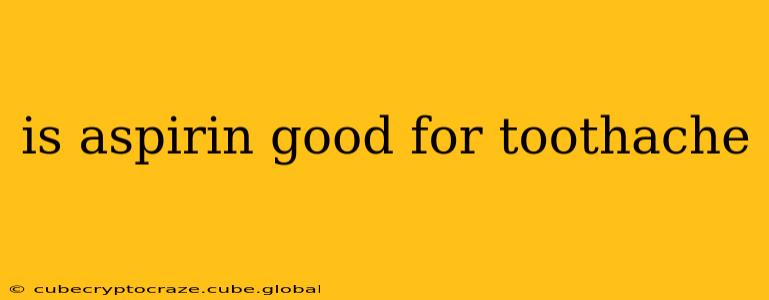A throbbing toothache can be incredibly painful, making it tempting to reach for the nearest pain reliever. Aspirin, a readily available over-the-counter medication, is often considered. But is aspirin truly a good solution for toothaches, and under what circumstances should you use it (or avoid it)? Let's explore this common question.
Does Aspirin Help with Toothache Pain?
Aspirin, also known as acetylsalicylic acid, is a nonsteroidal anti-inflammatory drug (NSAID) with analgesic (pain-relieving) and anti-inflammatory properties. It can provide temporary relief from the pain of a toothache by reducing inflammation and blocking pain signals. However, it's crucial to understand its limitations and potential drawbacks.
Aspirin's effectiveness is primarily focused on the pain associated with inflammation, such as that caused by an abscessed tooth or gum infection. It won't address the underlying cause of the toothache.
When Should You NOT Use Aspirin for a Toothache?
While aspirin might offer temporary relief, it's not a suitable solution for all toothaches. There are several scenarios where you should avoid using it:
- Severe Toothache: A severe, persistent toothache often signals a serious dental problem requiring immediate professional attention. Relying solely on aspirin can delay necessary treatment and potentially worsen the condition.
- Bleeding Gums: Aspirin acts as a blood thinner. If you have bleeding gums, applying aspirin directly to the affected area can increase bleeding and hinder clotting.
- Allergic Reaction: Some individuals are allergic to aspirin. Symptoms can range from mild skin irritation to severe anaphylaxis. If you have known aspirin allergies, avoid it completely.
- Children and Adolescents: Aspirin is associated with Reye's syndrome, a rare but serious condition that can affect the brain and liver. Therefore, aspirin should never be given to children or adolescents, especially during or recovering from viral infections like influenza or chickenpox. Always consult a pediatrician for appropriate pain relief options for children.
- Pregnant or Breastfeeding Women: Consult your doctor before taking aspirin during pregnancy or breastfeeding.
- Interactions with Other Medications: Aspirin can interact negatively with certain medications. Always inform your dentist or doctor about all medications you are taking.
What are Better Alternatives for Toothache Pain Relief?
For temporary relief of mild to moderate toothache pain, over-the-counter pain relievers like ibuprofen (Advil, Motrin) or acetaminophen (Tylenol) can be considered. These are generally safer than aspirin for children and those with certain medical conditions. However, remember that these medications only treat the symptoms, not the underlying cause.
How Should I Treat a Toothache?
The most important thing to remember is that a toothache is a symptom, not a disease. While over-the-counter pain relief can provide temporary comfort, it is essential to seek professional dental care. Ignoring a toothache can lead to more significant problems such as abscesses, infections, and even tooth loss.
A dentist can accurately diagnose the cause of your toothache and provide appropriate treatment, whether it's a simple filling, root canal, or extraction. Delaying treatment could lead to more extensive and costly procedures down the line.
Is it Safe to Put Aspirin Directly on a Toothache?
No, applying aspirin directly to a toothache is not recommended. This can cause gum irritation, burning, and potentially damage the soft tissues in your mouth. It's far safer to take it orally as directed on the packaging.
How Long Should I Wait to See a Dentist After Taking Aspirin for a Toothache?
Taking aspirin for a toothache does not replace a visit to the dentist. You should schedule an appointment with a dentist as soon as possible, regardless of whether you've taken aspirin or not. Aspirin only masks the pain; it doesn't address the underlying dental issue.
This information is for general knowledge and does not constitute medical advice. Always consult with a qualified healthcare professional for any health concerns or before making any decisions related to your health or treatment.
